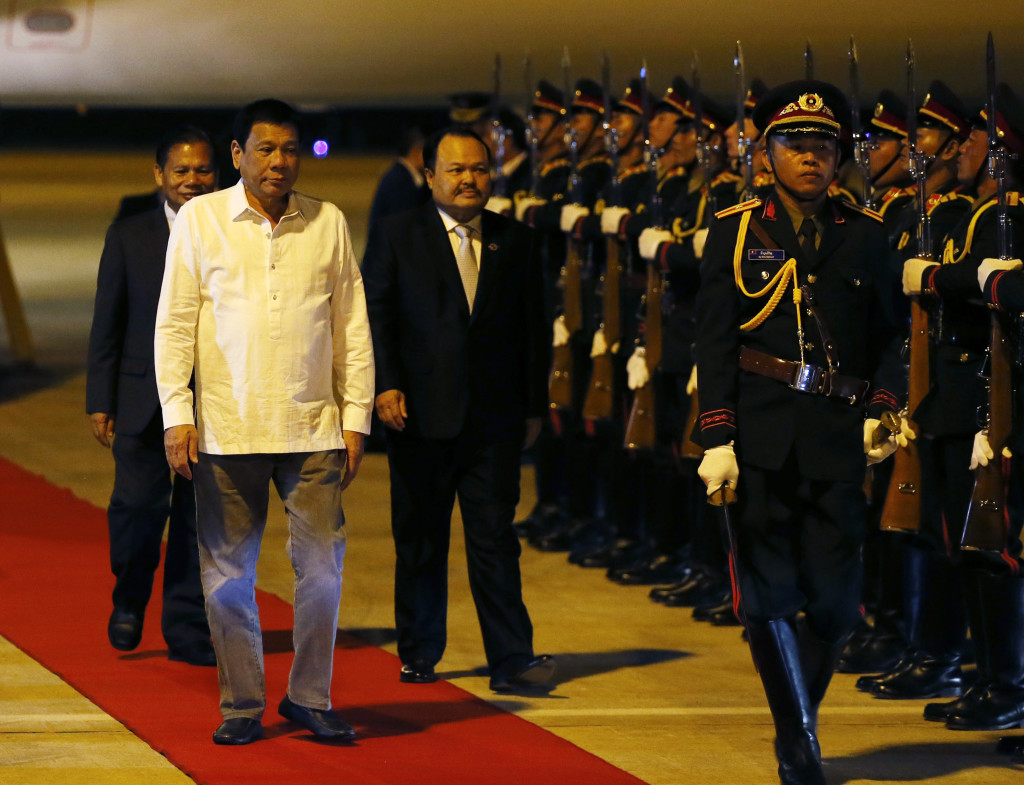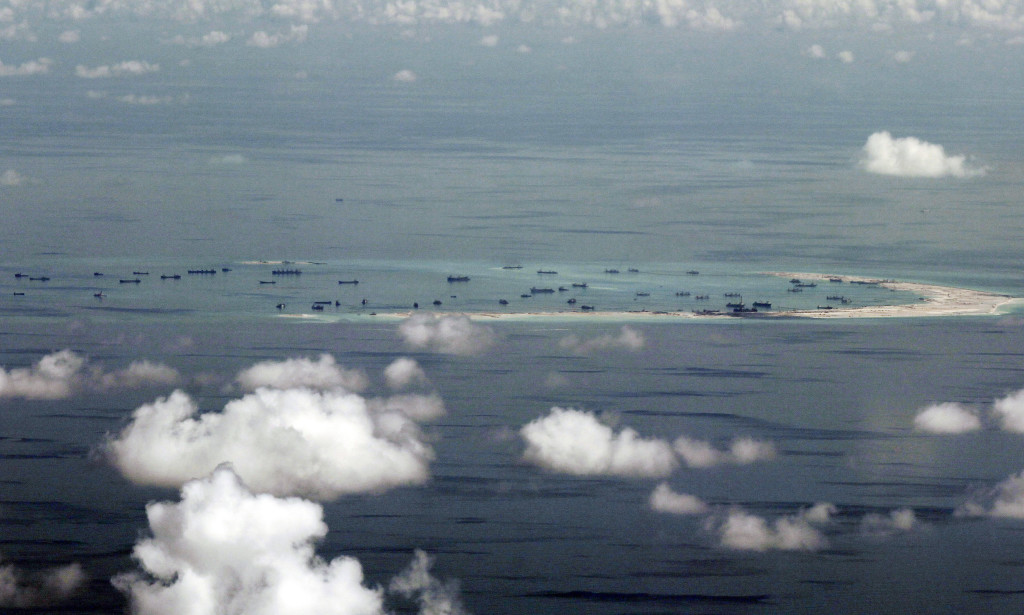Duterte policy to erode US influence in South China Sea – study

Philippine President Rodrigo Duterte reviews the troops upon arrival in Vientiane, Laos to attend the 28th and 29th ASEAN Summits and other related summits Monday, Sept. 5, 2016 in Vientiane, Laos. Laos is this year’s host of the annual regional meeting and its dialogue partners that includes the United States, Canada, Russia, Japan, China, South Korea, Australia, New Zealand and India.(AP Photo/Bullit Marquez)
MANILA — The Duterte administration’s “independent” foreign policy should not be belittled or underestimated, as it could “substantially” undermine the influence of the United States, a long-time ally and global superpower, in the region, the research arm of debt watcher Fitch Ratings said.
“Philippine President Rodrigo Duterte’s apparent foreign policy shift away from the US towards China could substantially undermine Washington’s geopolitical influence in Asia at a time when tensions between Beijing and its neighbors are rising. As a result, the US and Japan will increasingly attempt to cultivate Vietnam as a regional security partner in the South China Sea,” Fitch Group’s BMI Research said in a Sept. 30 report titled “Duterte’s foreign policy shift to undermine US’ geopolitical influence.”
The “rebalancing”—as described by members of Duterte’s Cabinet—of foreign policy is seen benefiting neighboring China, ironically the superpower brought to international arbitration by the Philippines over a maritime dispute on territories said to be rich in oil resources in the West Philippine Sea, in which Manila was later victorious.
“A major geopolitical shift in Asia appears to have begun in mid-2016, when Rodrigo Duterte became president of the Philippines, and this will undermine the US’s position to the benefit of China,” BMI Research said, noting that “Duterte’s predecessor, Benigno Aquino III, pursued a staunchly anti-China policy, as Beijing adopted an increasingly assertive stance towards its claims to the South China Sea.”
“Aquino bolstered the Philippines’ ties with the US and Japan, both of which are wary of China’s growing military power in Asia,” BMI Research further noted.
Article continues after this advertisementOn the other hand, “Duterte has adopted a noticeably anti-American tone, while sounding more accommodating towards China.”
Article continues after this advertisement“This suggests that the Philippines’ presence in an informal US-led bloc of Asian nations aimed at counter-balancing China’s rise is no longer assured,” according to BMI Research.
The report noted that because of its strategic location between global trade routes connecting the Pacific Ocean and the West Philippine Sea, the Philippines had gained geopolitical importance. “The US first recognised the Philippines’ strategic significance more than a century ago, when it seized the territory from Spain in the Spanish-American War of 1898,” it said.
Even after ending its rule over the Philippines when granted independence in 1946, the US kept close ties with Manila, it added.
The latest manifestation of close Philippine-US relations was in 2014, when Aquino signed a 10-year Enhanced Defense Cooperation Agreement with Washington, it noted.
In contrast, when the Hague-based Permanent Court of Arbitration ruled last July that China’s historical claim over more than four-fifths of the West Philippine was invalid, “Beijing immediately rejected the ruling, regarding the court as being biased,” BMI Research pointed out.
“China will most likely continue to consolidate its position in the South China Sea through the construction of artificial islands capable of housing military facilities, and most probably by declaring an Air Defense Identification Zone (ADIZ) over the sea in the near future,” it added.
According to BMI Research, “in contemporary Asian geopolitics, China regards the Philippines as a key element of the so-called ‘first island chain’ running from southern Japan and Taiwan down to the South China Sea, which the US formulated in the Cold War to contain the USSR and China.”
“Therefore, if the Philippines were to abandon the US-led network of alliances, it would be a severe blow to Washington’s ‘first island chain’ strategy,” BMI Research said.
“Even if the Philippines merely adopted a more neutral position, this would work to China’s advantage,” it added.
As for Duterte, BMI Research said his “volatile personality portends geopolitical confusion.”
“Duterte has generated international headlines since September 2016 by publicly cursing the US and EU, which criticised his anti-drug campaign for the estimated 3,000 deaths that it has caused. Duterte regards such criticism as infringements on Philippine sovereignty and has increasingly emphasised that he will pursue an ‘independent foreign policy’ that would entail warmer relations with China, and possibly Russia too,” the report noted.
But for BMI Research, “Duterte’s long-term foreign policy plans remain unclear.”
“He is a one of several populist leaders who have enjoyed a meteoric rise in 2016, and is not a member of the Philippines’ traditional US-aligned elite. As such, it is unsurprising that he has a different worldview to his predecessors,” BMI Research said.
“In addition, as a former mayor of Davao, Duterte lacks international experience, and could eventually find that his nationalist rhetoric is difficult to implement. Duterte also has a reputation for making bold or controversial statements, only for him or another senior official to backtrack somewhat afterwards, raising question marks about his true intentions,” it added. The BMI Research cited for instance contrasting statements from Duterte who had said the country would end patrols with the US in the disputed maritime territory, while his Foreign Affairs Secretary Perfecto Yasay “tempered” the President’s remarks.
As such, “Duterte’s apparent volatility carries political risks,” BMI Research said.
“Firstly, his somewhat anti-American tone could alienate the US or raise doubts about the Philippines’ reliability as an ally in US defense circles, regardless of who becomes the next American president. Washington will thus have to search for an alternative regional ally, and the likeliest candidate is Vietnam, which also has a territorial dispute with China in the South China Sea and is keen for closer ties with the US. However, Vietnam, more so than the Philippines, does not wish to subordinate itself to the US, given that it has for decades sought to act independently of world powers. Thus, it is unlikely that Vietnam would sign a formal alliance with the US,” it said.
In this regard, Duterte is seen “not necessarily [getting] on with the next US President,” whether Hillary Clinton or Donald Trump, according to BMI Research.
“We believe that President Duterte is unlikely to get on with the next US president, who will be elected on Nov. 8. Democratic candidate Hillary Clinton is more likely to ‘pivot’ US foreign policy towards the Asia-Pacific region, which would entail a more robust stance against China in the South China Sea. Yet Duterte’s desire for a more independent foreign policy suggests that he would not cooperate with the US strategy vis-à-vis China. In addition, Clinton, a proponent of spreading ‘American values’ internationally, is more likely to criticize human rights abuses in the Philippines, thereby earning Duterte’s ire,” it said.
As for Trump, BMI Research noted that he “has repeatedly questioned the usefulness of longstanding US alliances with countries such as Japan, South Korea, NATO members, and Saudi Arabia, suggesting that he would also question the need for the 1951 US-Philippines defense pact.”
“At the same time, Trump is a firm critic of China, meaning that he would probably seek to counter Beijing in Asia. Trump may find some common ground with Duterte, given their outspoken and controversial rhetoric, but if Duterte retains his anti-American leanings, then any commonality with Trump would not be sufficient to change his foreign policy,” BMI Research said.
“For the next six years, assuming that Duterte maintains his current positions, the Philippines is likely to see volatile relations with the US. Even if the Philippines does not align with China, the weakening of the US-Philippines alliance will work to Beijing’s favour by undermining the US-led group of countries seeking to counterbalance China,” the report said.

FILE – This May 11, 2015, file photo, shows land reclamation of Mischief Reef in the Spratly Islands in the South China Sea. (Ritchie B. Tongo/Pool Photo via AP, File)
It nonetheless noted that if Duterte “skilfully manoeuvres the Philippines between the US and China, he could increasingly be courted by both countries through promises of increased economic and defense cooperation, strengthening Manila’s sense of independence.”
Japan, another long-time ally, “will also become concerned about the Philippines’ possible shift towards China,” as Tokyo and Beijing also have territorial spats.
“Duterte has not antagonized Japan, but his apparently China-friendly stance will raise question marks in Japan’s foreign policy establishment. Duterte is due to visit China on Oct. 19-20, before travelling to Japan on Oct. 25-27. These visits should provide greater clarity on his stances towards Beijing and Tokyo,” BMI Research said.
As for Russia, another country that Duterte wanted to have closer ties with, the report noted that “Moscow has only very limited influence in Southeast Asia.”
“Duterte’s reference to Russia could be his way of signalling to the US that he is willing to befriend countries that are opposed to Washington as part of his foreign policy rebalancing. In practical terms, this could entail the purchase of Russian weapons, but probably little more. Alternatively, Duterte may have mentioned Russia as a hedge against China, given that the latter is still at loggerheads with the Philippines,” it said.
Last week, former foreign affairs secretary Albert del Rosario described as “unfortunate” the direction being pursued by the Duterte administration, as the think-tank named after him claimed investors have been deterred by a supposedly independent foreign policy.
“They should review what they mean by an ‘independent’ foreign policy. It should not be a zero-sum game,” Del Rosario told reporters on the sidelines of an economic forum organized by the Stratbase-ADR Institute for Strategic and International Studies last week.
For Del Rosario, “you can pursue the friendship of other nations without having to sacrifice those who all the time had been there to help us.”
“While the President’s mandate to define the country’s approach to foreign relations is unassailable, the administration should nevertheless reconsider its strategy in terms of potentially alienating established economic and security partners. The Philippines should maintain its good relations with trusted friends and pursue constructive relations with all of its neighbors, in both word and deed,” Manhit said, referring to the recent friendly moves by the President to China and Russia while being unfriendly to the EU and the US, which are among the country’s top trading partners,” ADR Institute president Dindo Manhit said.
“An unwelcoming atmosphere in the Philippines could easily dampen the country’s economic relationships. In the United States, as elsewhere, private investors have reportedly grown skittish about the Philippines’ prospects. The US economy is the Philippines’ largest source of private investment and second largest export market after Japan,” according to Manhit. SFM/rga